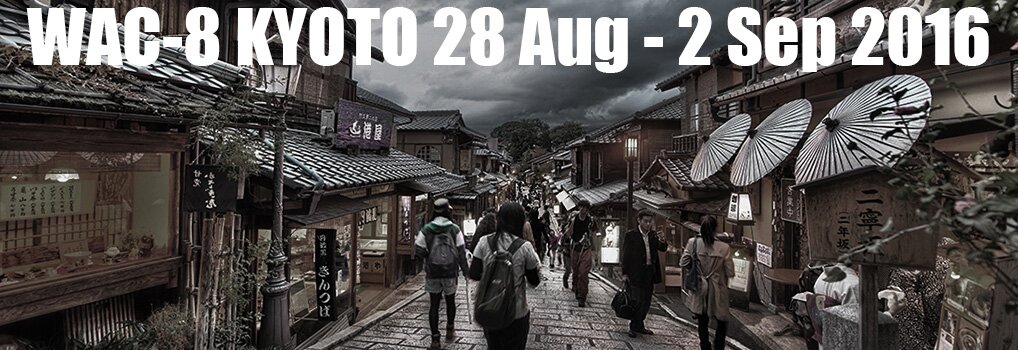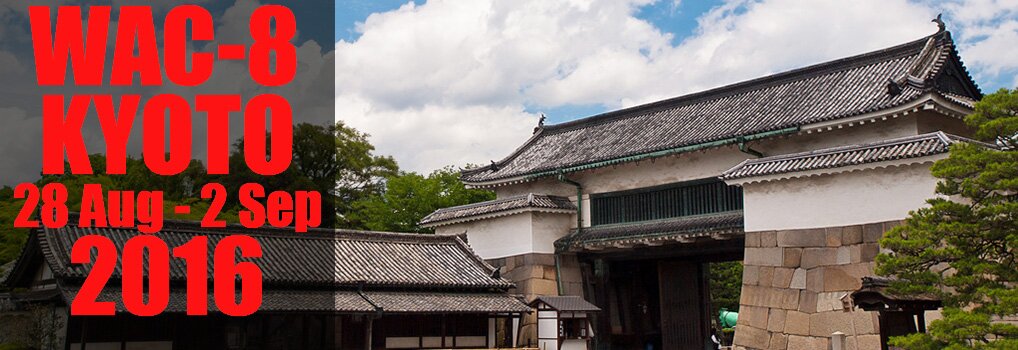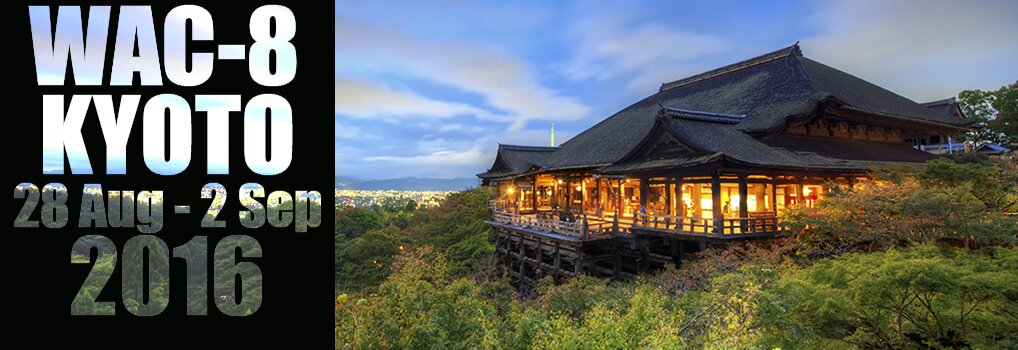| T01 | T02 | T03 | T04 | T05 | T06 | T07 | T08 | T09 | T10 | T11 | T12 | T13 | T14 | T15 |
| Theme list | Session organizers index | Accepted sessions list |
| T07. Education: Learning and Unlearning Claire Smith and Neel Kamal Chapagain |
|---|
| We all engage with ‘archaeology’ and ‘heritage’ from the perspectives in which we are educated. This ‘educated’ engagement with archaeology ultimately seeks to ‘educate’ others too, both archaeologists and non-archaeologists. However, these perspectives vary across the world, according to the culture in which we are embedded. Moreover, our ideas about education in archaeology evolve with practice and with age. Hence, education is not static resource pool, but a continuous process that involves the production, consumption, appropriation and reappropriation of knowledge. As new ideas are encountered old ideas have to be revisited, revised or rejected. New technology feeds into this. The Education theme at WAC-8 will take global approach to explore the different ways in which people share their evolving knowledge and wisdom, eventually contributing to the original source of their knowledge: their disciplinary field, understandings of archaeological sites and relationships with communities. The scope of investigation will span from the education of professionals to the education of the public. This theme will reflect upon various traits of education including: - formal or degree granting education; - professional/continuing education; - short term education/training programs; - informal education; - the use of modern media in education; - learning by doing, and - the education and uneducation of archaeologists (how people learn and unlearn things along the way). Sessions should be organized in one or more of the above or similar themes, and individual papers may be framed within the scope of each session. Some sessions may feature comparative discussions of different models of courses or course syllabi, or consideration of educational experiences within various schools of thought. Our final aim is to identify different perspectives and approaches to the central issue of education in archaeology. |
Educating the Masses: New Approaches to Teaching Digital Archaeology
Organiser(s): Philip Verhagen (Vrije Universiteit Amsterdam / Netherland) and Yasuhisa Kondo (Research Institute for Humanity and Nature / Japan)
Type: Symposium
Contact: j.w.h.p.verhagen(at)vu.nl
Abstract:
In archaeology, digital technology has up to now been mainly the province of experts. Mastering digital techniques is not an easy task, and will go at the expense of doing other aspects of archaeology. The consequence, however, is that ‘digital archaeology’ is mostly seen as a technicians’ specialization, whereas in current society new technologies take an ever more central role. We think that this separation of the digital side of archaeology from its mainstream discourse is detrimental to the integration of new technologies into archaeological practice. In order to critically reflect on the use of new technologies, we need to properly understand them. In this session we want to address how ‘thinking digitally’ can be integrated in the archaeological curriculum. How are we going to create a fruitful dialogue between the practices and theories of archaeology and the digital world? What skills should students master, even when they are not going to be experts in digital archaeology? What teaching methods are most appropriate? How can we educate the professionals? How can we ensure transdisciplinarity between archaeology and computer science? And how can we engage the computer science community to help educate new professionals?
This session proposal is one of two possible sessions to be organized by CAA.
Keywords: digital archaeology, teaching, archaeological practice and theory
Academic Education and Faculty Recruitment in Archaeology
Organiser(s): Lolita Nikolova (International Institute of Anthropology / USA) and Alexandra Comsa (Archaeological Institute, Bucharest / Romania)
Type: Debate
Contact: lnikol(at)iianthropology.org
Abstract:
Academic education is most important for development of professional skills of archaeologists. The goal of this debate is to focus on the pros and cons in academic education in archaeology by comparing academic programs and methods of recruitment of faculty members in different parts of the world.
Academic programs will be discussed from perspectives of archaeology as a field of anthropology and globalization of the academic knowledge. Revealing gaps in the course programs and in textbooks will assist the participants in this debate to develop a general model of the current state of archaeological academic programs (on-site, distant, mixed; regular and continuing education).
The methods of recruitment of faculty tenure and adjunct members are one of the primary factors of a successful academic education for the new generation archaeologists. Comparing of the academic policies of hiring worldwide may create opportunities for suggesting some universal strategic principals and specific peculiarities in order to increase the effectiveness of education and to make archaeology most respectful and more desirable profession.
Discussants: John Barretts (University of Sheffield / UK) and Neel Kamal Chapagain (Ahmedabad University/ India)
Keywords: education, faculty recruitment, academic programs
Journey from “The Excluded Past: Archaeology in Education”: How much have we progressed and where do we go next?
Organiser(s): Mizuho Ikeda (Waseda University / Japan), Peter Stone (Newcastle University / UK) and Masakage Murano (Museum of Kyoto / Japan)
Type: Forums
Contact: mizuho-ikeda(at)asagi.waseda.jp
Abstract:
In 1990, “The Excluded Past”was published resulting from the first World Archaeological Congress. It examined the interpretative bias of the past within education and revealed the relationship between the presented past and the power of dominant ideologies. Meanwhile, the role of archaeologists has gradually changed; community concerns and interests are now regularly taken into account in research. Non-archaeologists are no longer passive recipients of information and if anything, they play an important role in interpreting the past. Nowadays we identify the problems and share the information with fellow archeologists, specialists and non-specialists from various disciplines. However, under the fluid transitions occurring in society, concepts of education and heritage are also shifting. Once again we face the question of why we need to teach about the past and archaeology. How much have we progressed and where do we go next?
This panel encourages the participants to present examples of archaeological practice in education, interpretation of sites and museums by applying new approaches which aim to be cross-disciplinary in order to solve problems. Through this discussion, it aims to accumulate successful practices of archaeology with the public which can be applied in various regions, areas and groups with little modification.
Keywords: Public archaeology, archaeology education and community participation
Online Archaeology: Internet as a powerful tool for education and learning
Organiser(s): João Carlos Moreno de Sousa (Federal University of Rio de Janeiro / Brasil) and Kamani Perera (Regional Centre for Strategic Studies / Sri Lanka)
Type: Symposium
Contact: jcmorenodesousa(at)gmail.com
Abstract:
In many countries the general public does not have open access yet to scientific knowledge in layman’s language. Archaeology, for example, is still unknown, or misunderstood, by the general public in many parts of the world. However, we are able to apply different approaches to bring archaeological knowledge to people who use the internet, especially among people who do not know or recognize the importance of archaeological sites, artifacts etc. The internet is playing a significant role at this juncture and helps people to communicate across geographic barriers. Specialized websites, online videos, local and regional online news, interactive maps and social networks are some of the different approaches that have been used to promote archaeological knowledge throughout the world and to increase the sensitivity of the general public to archaeology and the protection of cultural heritage. This symposium will discuss use of internet as a tool for archaeological education and learning around the world. We are seeking papers that present current approaches, methods and techniques, as well as case studies.
Keywords: Internet learning; Digital Archaeology; Public Archaeology
Cancelled
Teaching Origins
Organiser(s): Lucy Johnson (Vassar College / USA), Mariana Sacchi ( / Argentina) and Benedicta Mangut (/)
Type: Forums
Contact: johnsonl(at)vassar.edu
Abstract:
Both professional archaeologists and the general public are fascinated by origins: when did people first arrive somewhere? Who were they? How did they come? Why did they come? Our understanding of the origins of various populations is always in flux as new sites, new technologies and new theories are applied to the question. In this session we will explore issues around this theme: how has your teaching of origins changed over the years? How do you teach origins to different audiences – e.g. senior citizens, a freshman writing seminar, a senior seminar for majors, a graduate seminar? How do you cope with different perspectives such as speculations based on untestable beliefs (e.g. spaceships)? the ideas of First Peoples on their origins (e.g. Native Americans, Australian Aborigines)? professional disagreements among archaeologists?
Papers are encouraged that will examine issues of pedagogy around these issues, and ample time will be allowed for discussion.
Example: Teaching the Native American Origins to senior citizens at a Center for Lifetime Learning and to a Freshman Writing Seminar.
Keywords: origins, perspectives, pedagogy
Heritage, Culture, and Education: Weaving Knowledges
Organiser(s): Paulette Steeves (University of Massachusetts at Amherst / USA) and Jasmine Willika (Flinders University / Australia)
Type: Symposium
Contact: psarchaeo(at)gmail.com
Abstract:
This session will highlight a broad range educational programs that focus on archaeology, heritage, culture, and diverse knowledges. We invite students, teachers, faculty, and community members to share their experiences and challenges. To create change on a global scale we must acknowledge the issues faced by standard colonized models of education and create programs that promote academic success. Linkages between student success and sustainable archaeology programs are built on discussions that involve un-learning the languages of conquest and colonisation and weave Indigenous knowledge throughout archaeological education. In addition, the integration of archaeology into school programs can redress foundational learnings that marginalise colonised people and provide engaging experiences in early science and environmental education. We seek global examples of using archaeology to embrace diversity and decolonisation, bridge formal and informal learning and create connections between communities, schools, museums and tertiary institutions.
Keywords: minority groups, education, Indigenous peoples, academic success
WACSC Forum on Careers in International Heritage
Organiser(s): Marta Lorenzon (University of Edinburgh / UK),Kate Ellenberger (Binghamton University / USA) and Jacqueline Matthews (The University of Western Australia / Australia)
Type: Forums
Contact: s1271179(at)sms.ed.ac.uk
Abstract:
The aim of this forum is to provide professional development advice for archaeology students interested in pursuing careers in international heritage organisations. The WAC Student Committee (WACSC) recognises that professional development is of immense value to students but that is often absent or informal at large international conferences like WAC, even though these environments provide a rare opportunity for students to access a wide-range of professionals. Furthermore, we consider it important in a globalised world that students receive advice not only on local/national archaeology careers, but also at the international level as the profession is becoming increasingly multidisciplinary and cross-cultural. This forum will fill both of these gaps. Our panellists will include a diverse range of professionals at various stages of their careers who will reflect on their experiences to provide advice and insights for future professionals who desire a career in government agencies, NGOs and international heritage organisations. The forum will be chaired by WACSC members and panellists will be open to questions and engage in discussion with the audience.
Keywords: international heritage, archaeology careers, professional development
The Presentation, Representation, and Reproduction of the Archaeological Object
Organiser(s): Michael Carrasco (Florida State University / USA) and Joshua Englehardt (El Colegio de Michoacan / Mexico)
Type: Symposium
Contact: mcarrasco(at)fsu.edu
Abstract:
Digital technologies have greatly enhanced archaeological documentation and research. Likewise, new media and visualization techniques have fundamentally changed the depth and scope of how information is disseminated and raised ethical and philosophical issues concerning authenticity, representation, reproducibility, preservation, and education that impact policy, stakeholders, and popular knowledge. This session explores how new technologies are and can be used in the diffusion of archaeological research and the presentation of the archaeological object and its context. We seek papers that investigate issues of visualization and presentation in educational, museum, and virtual contexts as well as the ethical issues provoked by new means of visualization and production. Papers will examine how digital technologies can be used to develop novel ways of sharing the archaeological object with a broader public via museums, websites, and 3D printing, among other avenues of dissemination. We are interested to see how these new forms of representation impact archaeological education and affect basic research, as these representations become the matrix through which new questions and models are constructed. We hope to query how we must think about the contextualization of this information so that it does not merely feed into a kind of artifactual fetishism of the past, but rather enhances people’s engagement with archaeological knowledge.
Keywords: Digital Archaeology, New Media, Visualization




